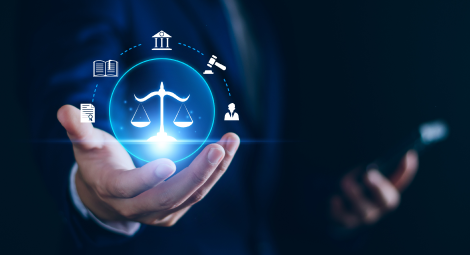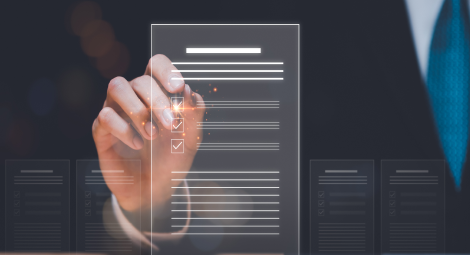In the ever-evolving landscape of the legal industry, one force stands out as a driving factor of change and innovation: artificial intelligence (AI). As we step into the future, AI's presence is becoming increasingly prominent, redefining the way legal professionals operate and interact with their practice. In this era of digital transformation, understanding the role of AI in shaping the legal landscape is paramount.
The Significance of AI in Shaping Legal Practice

AI's integration into the legal field signifies a monumental shift in how legal professionals approach their work. With its potential to streamline processes, enhance efficiency, and revolutionize traditional workflows, AI is a catalyst for transformation. The future of legal practice is intricately linked to AI's capabilities, which extend far beyond just automating tasks.
Unveiling Emerging Trends and Advancements
In the legal sector, AI is not merely a buzzword; it's a dynamic force that's continuously evolving. From enhancing research capabilities to automating document analysis and review, AI's applications are boundless. As we navigate the evolving landscape, it's crucial to keep a finger on the pulse of emerging trends and advancements that AI is bringing to the forefront of legal practice.
A New Paradigm of Efficiency and Innovation
AI's influence is not limited to streamlining legal tasks; it's about transforming the way legal professionals approach their roles. With predictive analytics, data-driven insights, and the ability to handle complex tasks with unparalleled accuracy, AI equips legal practitioners to rise above challenges and deliver exceptional outcomes. As AI's capabilities expand, so too do the horizons of legal practice, opening doors to unprecedented levels of efficiency and innovation.
In the subsequent sections of this article, we will delve deeper into the various dimensions of AI's impact on the legal industry. From exploring its applications in legal research and document analysis to addressing concerns and questions about its integration, we'll uncover the multifaceted journey of AI's integration into the legal profession.
The Role of AI in Shaping Legal Practice

In a realm where accuracy, precision, and efficiency are paramount, AI emerges as the quintessential ally for legal professionals. Its role extends far beyond mere automation; it's about reimagining the very foundation of legal practice. Here, we delve into the transformative role AI plays in reshaping traditional legal workflows and paving the way for a more efficient, effective future.
These thoughts and ideas were a main talking point in this years LEX Summit when FIlevine CEO Ryan Anderson stated. "AI will replace lawyers,,,, who fail to adapt with it."
Revolutionizing Traditional Workflows
AI's impact on legal practice is akin to a seismic shift, altering the landscape in profound ways. From contract review to legal research, AI-powered tools have the potential to revolutionize how legal tasks are executed. By handling mundane tasks with speed and accuracy, AI frees up legal professionals to focus on strategic decision-making and high-value activities that demand their expertise.
Optimizing Legal Research and Document Review
In the world of law, research and document review are the bedrock of building strong cases and making informed decisions. AI-driven algorithms, powered by natural language processing and machine learning, can sift through vast troves of data with lightning speed. This not only expedites the research process but also enhances its accuracy, ensuring that legal professionals have access to comprehensive and relevant information at their fingertips.
Unveiling Efficiency Through AI-powered Tools
The time-intensive nature of legal work often leads to prolonged timelines and cumbersome processes. AI-enhanced tools are changing this narrative by automating repetitive tasks such as document indexing, due diligence, and contract analysis. This translates to enhanced efficiency, faster turnaround times, and ultimately, the ability to serve clients more effectively.
As AI continues to permeate the legal realm, its impact on traditional practices is undeniable. It's not about replacing legal professionals; rather, it's about augmenting their capabilities, empowering them to deliver results with unprecedented precision and speed. The future of legal practice is one where AI is seamlessly integrated, functioning as a strategic partner that complements human expertise and takes legal operations to new heights. In the upcoming sections, we'll dive deeper into specific applications of AI and how they are reshaping the landscape of legal practice.
Emerging Trends in Legal AI
In the dynamic landscape of legal technology, AI stands as a driving force behind numerous groundbreaking trends and developments. As the legal industry adapts to the digital age, these emerging trends in legal AI are shaping the future of practice in unprecedented ways.
- Enhanced Predictive Analytics
The power of AI lies in its ability to predict outcomes by analyzing extensive data sets. In the legal realm, predictive analytics fueled by AI are transforming the decision-making process. By analyzing past case outcomes and legal precedents, AI can provide lawyers with valuable insights into potential case trajectories, enabling them to make more informed strategic choices.
- Natural Language Processing (NLP)
The capability of machines to understand and process human language is at the core of NLP. This technology is revolutionizing legal research by enabling AI systems to comprehend complex legal documents, contracts, and statutes. Legal professionals can now swiftly extract relevant information from vast quantities of textual data, saving time and ensuring accuracy.
This type of feature is present within AI Fields, with the ability to analyze and summarize case information into specified text boxes to insert in your documents.
- Contract Analysis and Due Diligence
AI's prowess in contract analysis is revolutionizing due diligence procedures. By scanning and categorizing contractual terms and conditions, AI can flag potential risks and discrepancies, allowing legal teams to prioritize areas that demand closer scrutiny. This not only expedites the due diligence process but also minimizes the risk of oversight.
- Virtual Legal Assistants
Imagine having a virtual assistant adept at legal research, document drafting, and managing schedules. Virtual legal assistants powered by AI are becoming an integral part of legal teams, shouldering administrative burdens and freeing up attorneys to focus on core legal tasks.
- Real-world Examples
AI's presence is already palpable in the legal sector. For instance, AI-powered tools are streamlining eDiscovery processes by swiftly identifying relevant documents and reducing the time and cost associated with document review. Additionally, platforms are emerging that can predict the outcome of legal cases with remarkable accuracy, offering valuable insights to lawyers as they build their strategies.
The field of legal AI is evolving rapidly, and these trends exemplify its capacity to reshape traditional practices, increase efficiency, and provide legal professionals with powerful tools for success. As we delve further into the future of AI in legal practice, the possibilities and potentials continue to expand, marking an exciting era of transformation for the entire legal industry.
Enhancing Legal Workflows with AI
In the ever-evolving landscape of the legal profession, embracing technological advancements is no longer optional; it's essential for staying competitive. AI, in particular, is proving to be a game-changer when it comes to enhancing various legal workflows.
- AI Streamlining Contract Review
Contracts are the lifeblood of legal practice, but reviewing them can be time-intensive. Enter AI-powered contract review tools. These solutions can swiftly analyze contracts, identifying critical terms and potential risks. This not only expedites the review process but also minimizes the chances of oversight, ensuring that legal professionals have a comprehensive understanding of the agreements they're dealing with.
- AI Assisting Case Analysis
In-depth case analysis requires combing through extensive amounts of data, a task that can be arduous and prone to human error. AI algorithms, however, can efficiently analyze vast datasets, extracting relevant information and patterns. This enables lawyers to build stronger cases by leveraging insights that may not be immediately apparent. The ability to quickly sift through data allows legal professionals to focus on crafting more effective arguments and strategies.
- Accelerating Legal Document Generation
AI-driven legal document generation is a boon for time-strapped legal practitioners. With the power of AI, drafting legal documents like contracts, pleadings, and demand letters becomes a more efficient process. These AI tools can customize templates, adapt language to specific cases, and ensure the accuracy of legal terms. This not only saves valuable time but also reduces the risk of errors commonly associated with manual document creation.
- Transforming the Legal Landscape
AI's ability to streamline legal workflows is not just about saving time; it's about fostering a new level of efficiency that allows legal professionals to focus on what truly matters: delivering exceptional legal services. As AI continues to advance, its impact on contract review, case analysis, and document generation will become increasingly pronounced. By embracing these AI-powered tools, law firms can navigate complex legal tasks with greater ease and accuracy, setting the stage for a more productive and innovative future in legal practice.
Addressing Concerns and Questions about AI in Law
As AI continues to make inroads into the legal sector, questions naturally arise about its practical applications and potential impacts. Let's delve into some of the inquiries surrounding AI in the legal practice:
- How AI is Used in Legal Practice
AI's utilization in legal practice is multi-faceted and spans a range of functions. It's employed for tasks like legal research, contract analysis, document review, and even predictive analytics. These AI-powered tools empower legal professionals to perform their tasks more efficiently, with higher accuracy and less manual effort. By harnessing AI's capabilities, lawyers can focus on strategic decision-making and delivering value to clients.
- Real-World Examples of AI Integration
AI's impact is already evident in legal tech solutions. For instance, legal research platforms powered by AI algorithms can swiftly scan vast databases, extracting relevant cases and precedents. AI-driven contract review tools can quickly identify clauses that may need further attention. These examples showcase how AI is augmenting legal workflows and helping practitioners make more informed decisions.
- Paralegals and the Role of AI
One common question is whether AI will replace paralegals. Rather than a replacement, AI is poised to be a powerful ally to paralegals. Routine and time-consuming tasks, such as document review and organization, can be handled by AI tools, freeing up paralegals to focus on more complex and strategic responsibilities. AI complements human skills, enhancing efficiency and allowing paralegals to contribute to higher-level tasks that require critical thinking and expertise.
- A Collaborative Future
While concerns about job displacement are valid, the future of AI in law is not about replacement but collaboration. AI's strengths lie in its ability to handle data-driven tasks efficiently, leaving legal professionals with more time for interpretation, analysis, and client interaction. The synergy between AI and legal practitioners promises a more streamlined, efficient, and innovative legal landscape, where both humans and machines work in tandem to achieve optimal outcomes.
Current Uses of AI in Law
As AI continues to evolve, its integration into various legal processes has been transformative, aligning seamlessly with Filevine's commitment to enhancing legal workflows.
- Redefining Legal Research
AI's ability to swiftly sift through vast volumes of legal documents and precedents can align with your need for greater efficiency. By analyzing cases, statutes, and regulations, AI assists legal professionals in conducting comprehensive legal research. This synergy between AI and human expertise ensures that legal research remains accurate, timely, and insightful.
- Elevating Efficiency in Services
AI-powered chatbots and virtual assistants provide swift responses to routine legal inquiries, freeing up legal professionals to focus on complex matters. This synergy between AI and human expertise enhances overall client experience and satisfaction.
The symbiotic relationship between AI and the legal field can amplify the capabilities of legal professionals. As you navigate the ways in which AI is shaping the legal landscape, it's important to understand how AI is seamlessly integrated into Filevine's offerings, contributing to a holistic legal tech experience.
The Future of Law Firms and AI
As the legal industry evolves, the symbiotic relationship between law firms and AI becomes more pronounced, shaping a future that is both innovative and collaborative.
- Improved Efficiency and Accuracy
AI's integration into law firms offers transformative benefits. Mundane tasks like document review, legal research, and due diligence can be handled efficiently by AI-powered tools. This translates to significant time savings, allowing you and your team to focus on high-value activities that demand your expertise. Moreover, AI's ability to process vast amounts of data with precision contributes to heightened accuracy and reduces the risk of human error.
- Enhancing Client Service and Decision-Making
AI's capabilities extend beyond efficiency gains. Armed with AI-powered insights, you and your firm can provide clients with more informed advice and strategic recommendations. Data-driven predictions can aid in assessing case outcomes and developing optimal strategies. Clients benefit from a higher level of service, receiving well-informed guidance that leads to more successful outcomes.
- The Evolving Role of Legal Professionals
While AI enhances efficiency and augments decision-making, its presence doesn't diminish the role of legal professionals like you. In fact, it amplifies your impact. You can have more time for strategic thinking, relying on AI to handle repetitive tasks, while you focus on complex analysis, creative problem-solving, and client engagement. The future will be full of legal teams operating seamlessly alongside AI-powered tools, collectively delivering comprehensive legal services.
- A Harmonious Coexistence
The future of law firms is characterized by a harmonious coexistence between AI and human expertise. Legal professionals will harness AI's power to streamline processes, enhance accuracy, and provide data-driven insights. This collaboration empowers lawyers to excel in their roles and meet the evolving needs of clients in a rapidly changing legal landscape. As law firms continue to embrace AI's potential, the partnership between technology and human ingenuity will define a new era of legal practice.
Embracing the AI-Powered Legal Landscape
The integration of AI into the legal sector is no longer a futuristic notion; it's a reality shaping the present and the future of legal practice.
- Unveiling New Horizons
The legal landscape, once defined by tradition and meticulous manual work, is undergoing a seismic shift powered by AI. From streamlining processes to enabling predictive analytics, AI-driven tools empower legal professionals to excel in their roles. By embracing this transformation, law firms position themselves at the forefront of innovation, ensuring they remain competitive and agile in an ever-evolving field.
- A Call for Adaptability
Staying informed about AI's advancements is more than an option; it's a necessity. Legal professionals who adapt to AI's potential are better equipped to handle the complexities of modern legal practice. By understanding the nuances of AI-driven tools, legal experts can provide more comprehensive and efficient services to their clients, cementing their position as trusted advisors in the digital age.
- Harnessing AI for Enhanced Legal Practice
The path forward is clear: embrace AI as a partner, not a replacement. Legal professionals who harness AI-powered tools amplify their capabilities and elevate their practice. With AI handling routine tasks, lawyers can focus on strategic analysis, creative problem-solving, and client relationships. The result is a legal landscape that blends human expertise with technological prowess, ensuring the best possible outcomes for clients and the legal profession as a whole.
Conclusion

The legal world is in the midst of an AI-driven revolution that promises to redefine the way legal professionals work and deliver value to clients. As AI becomes an integral part of legal practice, the possibilities for enhanced efficiency, accuracy, and innovation are limitless.
As we step into the future, one thing is clear: AI and legal practice are not opposing forces, but synergistic partners. With AI's assistance, legal professionals can amplify their impact, deliver more informed counsel, and drive innovation across the industry. The future of law is a journey of exploration and collaboration, where AI empowers legal experts to redefine what's possible, one case at a time.